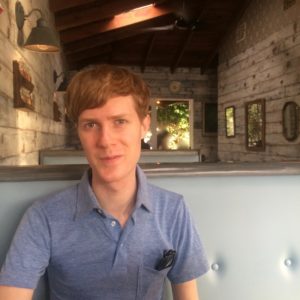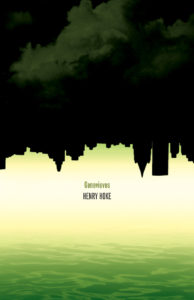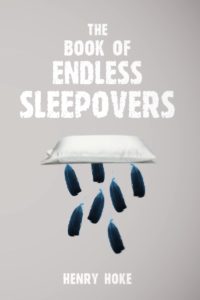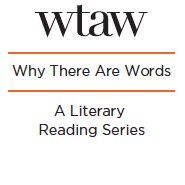Interview with Henry Hoke by Linda Michel-Cassidy
 Genevieves (Subito Press, 2017)
Genevieves (Subito Press, 2017)
The Book of Endless Sleepovers (Civil Coping Mechanisms, 2016)
In the fall of 2016, I heard Henry Hoke read at E.M. Wolfman in Oakland, CA, for the release of his first book, The Book of Endless Sleepovers. It was a curious and wonderful reading, and I was thrilled to hear the author had a second book in the works. Hoke reads Thursday, May 11th at Why There Are Words, as part of the reading tour for the release of this second book, Genevieves. Below, Hoke and I discuss breaking free from the constraints of genre, retrospect, and tethering, among other things. –-Linda Michel Cassidy
 At my worst moments I stand at home or think of home and it hits me: no, I didn’t survive this. “Wentz” Genevieves
At my worst moments I stand at home or think of home and it hits me: no, I didn’t survive this. “Wentz” Genevieves
What you need to know is that we daydream best in the middle of battles. “Exploding Henry Hoke Dolls” The Book of Endless Sleepovers
Linda Michel-Cassidy: I find it refreshing that you write of childhood as this sinister and complex time, as opposed to taking a stance of cottony nostalgia. I’m wondering if maybe children are the more intricate characters, and the weight of living a life flattens us?
Henry Hoke: I think the intricacies of childhood are something we can only really unpack in retrospect, given the overwhelming discovery of that era of life. I agree there’s a weight that descends with age, and what emerges is certainly nostalgia, but not for the real feelings and awfulness of growing up. I wanted to mix it up with all those varied elements. What do we long for in the past, and what do we hope to forget, and how can we illuminate and confront those opposing forces?
LMC: Your writing seems to land between and among a lot of things; it’s genre-free or maybe all the genres. Inter-genre? Is there a freedom from writing in so many forms and (I’m presuming here) writing from personal history, conjecture, and maybe a bad dream or two?
Henry Hoke: As far as personal history, I presume most fictions are spun from the author’s truth in one way or another, so I make impulsive decisions to let these cracks show/invite readers to question veracity.
As far as genre, whenever I adhere too closely to a single form I lose the excitement and vitality in the writing process. All the books I’ve written and am currently writing revolve more around themes and images and story, as opposed to one formal expression. So, I tend to leave things open, veering when it feels right between prose and poetry and script forms. More and more I see genre becoming obsolete. With the availability of so many dynamic books, why limit someone’s perception of a work or give them an excuse for a snap judgment? We only need to claim a genre for unfortunate edifices like parental approval or marketing or awards. If genre serves as a constraint and guiding light for a writer’s process, wonderful, but beyond that I have little faith in the future of cold designations.
 LMC: You take the resonant and terrifying objects of childhood nightmares (or mine, at least): prosthetics, digits found in the wild, dolls with weird special skills, and bring them into adulthood. Is this because you want to remind us that we can’t grow out of our haunting?
LMC: You take the resonant and terrifying objects of childhood nightmares (or mine, at least): prosthetics, digits found in the wild, dolls with weird special skills, and bring them into adulthood. Is this because you want to remind us that we can’t grow out of our haunting?
Henry Hoke: Absolutely. I feel like we carry these strange objects inside us, and the mysteries they hold give us power. So, I don’t view haunting (and by metaphorical association: trauma or illness/disability) as inherently negative. I view it as deepening humanity and connectivity.
LMC: Tell us about your use of repetition. Refrains appear in “Wentz,” “Fall Backs,” and “Many,” which uses anaphora.
Henry Hoke: Anaphora is a word I hadn’t heard until now, but yes! I use it to anchor some of my more iterative pieces. Iterative in that they have multiple truths running simultaneously, from the perpetual returning home of Carolina Cone in “Wentz,” to the shifting maternal figures in “Many.” The repeated phrases may normalize/vanish for the reader, but they tether the chaos/uncertainty.
LMC: Thanks so much, and I’m so looking forward to your reading.





